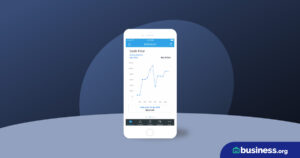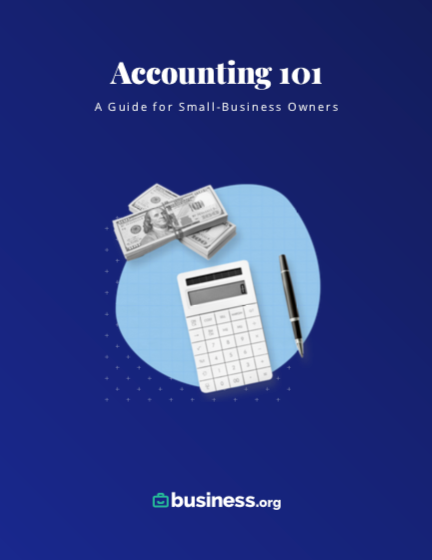💸 See if your business qualifies for a tax credit worth up to $26k per employee. 📞 Call Now: 855-979-9597
The 9 Best Small-Business Accounting Software of 2023
Data as of 5/3/23. Offers and availability may vary by location and are subject to change.
*Only available for businesses with an annual revenue beneath $50K USD
**Current offer: 50% off for 3 mos. or 30-day free trial
†Current offer: 50% off for three months or 30-day free trial
‡Current offer: 75% off for 3 mos. Available for new customers only
We are committed to sharing unbiased reviews. Some of the links on our site are from our partners who compensate us. Read our editorial guidelines and advertising disclosure.
The bottom line: Xero is our favorite accounting service for small businesses. With free unlimited users, it's an excellent pick for collaborative businesses like multi-partner LLCs. Its low starting price and excellent app also make it a prime fit for freelancers, contractors, and other sole proprietors.
Not interested in Xero? FreshBooks is a good alternative for business owners who want unlimited invoices. QuickBooks Online works well for business owners who value solid reporting and tax tracking, and Zoho Books affordably automates key tasks that can suck up business owners’ time. Finally, Wave Accounting is a good free accounting option for budget-cautious freelancers and small-business owners.
- : Best features
- : Best invoicing
- : Budget pick
- : Best overall accounting software
- : Most user-friendly
Compare the year's best accounting software
Data as of 5/3/23. Offers and availability may vary by location and are subject to change.
*Only available for businesses with an annual revenue beneath $50K USD
**Current offer: 50% off for 3 mos. or 30-day free trial
†Current offer: 50% off for three months or 30-day free trial
‡Current offer: 75% off for 3 mos. Available for new customers only
Zoho Books is the most comprehensive accounting software
Data as of 5/3/23. Offers and availability may vary by location and are subject to change.
*Only available for businesses with an annual revenue of <$50K USD. Paid plans start at $15.00 a month when billed annually.
Zoho Books automates the most common (and, let's face it, boring) bookkeeping tasks—which means you can dedicate more time to your business and customers and less time to the tedious task of data entry. Most notably, it lets you set automatic customer payment reminders, create recurring expense profiles, and manage 1099 contractors.
Plus, Zoho Books is just one piece of software in the larger suite of Zoho products. Each Zoho product integrates easily with the rest, which means that along with accounting, you can use Zoho for project management, inventory management, and customer relationship management (CRM)—just for a start.
Here's the best part: if you make under $50K a year, you can take advantage of Zoho Books' free plan. Otherwise, Zoho Books starts at $15 a month if you pay annually or $20 if you pay month to month. The cheapest plan includes three users, but you can also pay an extra $2.50 per month for each additional user. That’s a standout bargain, especially compared to FreshBooks' extra $10 per user per month. Zoho also offers discounts to nonprofits—one reason it's among our top financial management software picks for nonprofits that need true fund accounting.
Unfortunately, even though it’s a solid accounting tool, Zoho Books has one huge flaw: Zoho doesn't offer a payroll plan integration unless you live in California, Texas, or India. And it doesn't integrate with third-party payroll providers either. Instead, you have to manually update the payroll-related aspects of your books, which detracts from Zoho's primary perk of automation in a big way.
Similarly, Zoho Books’s cheapest plan doesn’t include automatic journal entry creation. Instead, whenever you debit or credit an account, you’ll have to manually create an entry. If you log more than a few transactions a month, the lack of automation adds major time and hassle—you’ll want the $40 a month (or $50, billed monthly) Professional plan instead.
FreshBooks is the best software for invoicing
Data as of 5/3/23. Offers and availability may vary by location and are subject to change.
*30-day free trial or 50% off for 3 mos. Price increases to $17.00/mo. when promotional period ends.
FreshBooks’s combination of stellar features, customizable invoices, and well-reviewed mobile apps make it pretty much perfect—especially for freelancers. Unlike Xero, FreshBooks lets you send an unlimited number of invoices and estimates with every plan. Each plan also includes time tracking for easier, more accurate client billing. FreshBooks’s built-in small-business expense tracking helps you maintain a balanced budget. And, like QuickBooks Online, FreshBooks includes built-in mileage tracking—a must for freelancers who plan to claim mileage expenses on their year-end tax forms.
But while FreshBooks doesn’t limit your invoices, it does limit the number of customers you can bill each month. You can send your customers an unlimited amount of invoices, but the cheapest plan limits that client number to just five.
Additionally, FreshBooks doesn’t include bank reconciliation with its cheapest plan. Since bank reconciliation is an absolutely foundational accounting task, we can only recommend FreshBooks’s cheapest plan to freelancers or brand-new startups with just a few transactions a month.
Wave is the most affordable accounting software
Data as of 5/3/23. Offers and availability may vary by location and are subject to change.
For exactly $0, Wave presents you with a slick, user-friendly dashboard and a slew of features that rival those of paid accounting systems. For instance, Wave Accounting includes multi-currency support, expense tracking, unlimited invoicing, unlimited bank account connections and double-entry accounting—a more accurate method of accounting that FreshBooks' basic business accounting plan notably lacks.
Wave also lets you juggle multiple businesses with the same account. If you're an Amazon or eBay seller who also manages a small team of contractors, you can track both sets of finances without paying anything.
Even though Wave has a useful payroll tool, its accounting software isn't necessarily right for businesses with dozens of employees. Since Wave offers just one accounting plan, businesses can't scale up to plans that include more accounting tasks for growing businesses. And Wave's lack of inventory tracking makes it better matched to service-based solopreneurs and freelancers who don't need both accounting and inventory software.
Xero is the best overall accounting software
Data as of 5/3/23. Offers and availability may vary by location and are subject to change.
*Current promotion: 75% off for three months. Offer available for new customers only.
We love Xero for its robust features and low starting price. For the regular price of just $13 a month, Xero lets you send custom invoices, reconcile bank transactions, capture receipts for easier record keeping, and track inventory.
But as a small-business accounting tool, Xero really stands out on the collaboration front. Unlike nearly every other accounting solution (including QuickBooks and FreshBooks), all of Xero's accounting and inventory software plans include unlimited users. You don't have to pay extra to delegate responsibilities like bank reconciliation or expense tracking to another team member: time-saving collaboration is built into your price.
However, Xero's $13 a month plan limits you to entering only five bills and sending only 20 invoices a month. You can send unlimited invoices and quotes with only the Growing and Established plans, which start at $37 and $70 a month, respectively. Plus, you can only track expenses with the priciest plan. In contrast, both QuickBooks and FreshBooks offer small-business expense tracking up front.
By signing up I agree to the Terms of Use and Privacy Policy.
QuickBooks Online is the most user-friendly accounting software
Data as of 5/3/23. Offers and availability may vary by location and are subject to change.
*30-day free trial or 50% off for three months. Price increases to $30.00/mo. after promotional period.
QuickBooks is easily one of the most popular financial, tax, and accounting software options in the world. And while QuickBooks Desktop (especially the fairly comprehensive, comparatively affordable QuickBooks Pro Plus) is still an option for those who prefer desktops, QuickBooks Online is Intuit’s cloud-accounting software solution.
The basic Intuit QuickBooks Online plan includes typical features like invoicing, billing, and receipt scanning along with more comprehensive tracking than many competitors:
- Mileage tracking
- Sales tax tracking
- Automatic tax deduction categorization
- 1099 contractor payment tracking
- Thorough reporting, including accounts receivable
QuickBooks also has the absolute best mobile accounting app you can find. The app can do basically everything the software can (a rarity for any software provider, no matter the industry). If you work on the go, QuickBooks's app, which includes mobile mileage tracking, might make it a good fit.
Intuit QuickBooks's online reporting and tracking features come at a price, though: its cheapest small-business plan starts at $30 a month and restricts you to one user plus an accountant. The priciest plan, which includes 25 users, starts at $200 a month.
At $15 a month, QuickBooks Self-Employed is a cheaper financial management option. However, QuickBooks Self-Employed targets freelancers with just a few clients and limited expenses. Instead, it's primarily an invoicing, mileage-tracking, and tax-tracking plan. That means it helps sole proprietors who file Schedule C forms maximize their tax returns, but it's not a fully featured bookkeeping or accounting app for other business owners.
Accounting software honorable mentions
Not sold on our top picks? Here are five more small-business accounting software options that could work better for you.
- : Best user experience runner-up
- : Best for sales teams
- : Easiest setup
- : Most affordable runner-up
Top feature comparison: Accounting software honorable mentions
Data as of 5/3/23. Offers and availability may vary by location and are subject to change.
Sage Business Cloud Accounting: Best user-experience runner-up
Data as of 5/3/23 Offers and availability may vary by location and are subject to change.
Sage Business Cloud Accounting’s cheapest plan lets you create invoices, track amounts owed, and automatically reconcile your bank accounts. If you’re willing to pay a bit more ($25 a month), Sage Accounting adds unlimited users, quotes, estimates, cash flow forecasting, and purchase invoice management.
Unfortunately, Sage charges extra for receipt scanning, a feature competitors like Wave, FreshBooks, Xero, and QuickBooks include for free. And Sage’s pricier plan has built-in features than, say, Xero’s cheapest plan. (On the other hand, Sage's accounting system doesn’t limit your monthly invoice amount).
If you're looking for industry-specific accounting software, Sage some standout solutions beyond Sage Business Cloud Accounting. For instance, Sage 100 Contractor is a preferred accounting option for professionals in the construction business. And Sage Intacct is one of the best accounting services for nonprofits.
Sage Business Cloud is currently offering new customers 70% off for their first six months of Sage Accounting—which typically costs $25 a month. With the discount, your price goes down to $7.50 for six months. If you're considering Sage, we highly recommend taking advantage of the discount to save more than $100.
OneUp: Best for sales teams
Data as of 5/3/23. Offers and availability may vary by location and are subject to change.
All of OneUp's plans include customer relationship management (CRM) features, which makes it perfectly suited to sales teams that frequently follow up with customers. Plus, it's affordable: pricing for one user starts at $9 per month. If you’re a Mac user, though, you’re out of luck: OneUp works only for Windows users. And while every OneUp plan includes all of OneUp’s features, its plans limit your user numbers. Only the priciest plan, which starts at $169 a month, includes unlimited users.
Kashoo: Easiest setup
Data as of 5/3/23. Offers and availability may vary by location and are subject to change.
Got a minute to spare? You can set up Kashoo in 60 or so seconds, and the app immediately starts to categorize your expenses and learn your business spending habits. Like Zoho Books, Kashoo's automation is its selling point—and unlike Zoho Books, it syncs with SurePayroll, one of our top payroll providers.
Kashoo's accounting software starts at $20 a month. If you’re looking for a cheaper solution, Kashoo offers an invoice-centric plan for $0.00. Along with sending invoices, you can use the free plan to track expenses, accept online payments, and send estimates. We're not sure if the free plan lets you track income and expenses or not—Kashoo's site gives contradictory answers.
Either way, though, it looks like Kashoo is planning on developing expense and income tracking for its free plan, if it doesn't include those two features already.
ZipBooks: Most affordable runner-up
Data as of 5/3/23. Offers and availability may vary by location and are subject to change.
If you don't need quite as many features as Wave offers, ZipBooks is a solid free accounting software alternative. Even though it's free, it doesn't limit the number of invoices you can send (like Xero) or clients you can bill (like FreshBooks) per month—you can access unlimited customizable invoices and accept payments too. ZipBooks' paid plan starts at $15 a month and offers better bookkeeping and automation features than its free accounting plan. But if you prefer your accounting tools on the go, look elsewhere. ZipBooks' iOS app has disappeared from the App Store, and it's never had a Google Play app worth mentioning.
The takeaway
If you want fully featured accounting software with an excellent app, clean dashboard, and affordable price, we recommend Xero. Based on its features and pricing alone, it's a great bookkeeping and accounting company for most business types, from freelancers to LLCs.
All of our other picks have something to offer too, so if you find Xero isn't a good fit, try one of these alternatives:
- QuickBooks Online is an extremely comprehensive accounting solution with one of the best accounting apps and most thorough financial statements you can find. With up to 25 users, its most expensive plan suits bigger businesses with large, collaborative accounting teams.
- FreshBooks easily offers the best invoicing of any provider on our list. Its invoice, estimate, and payment acceptance features make it ideal for on-the-go contractors and freelancers who frequently collaborate with clients.
- Zoho Books has about as many features as QuickBooks at a lower price and a low additional user fee. Its free plan is perfect for freelancers who want solid reporting and financial tracking without any overwhelming bells and whistles (for instance, QuickBooks' dozens of customizable reports).
- Wave Accounting is the best free accounting solution for most freelancers, contractors, and other small-business owners. While it has fewer financial reports than other accounting systems, it's perfect if you juggle multiple businesses, want to add multiple users, or need unlimited expense tracking.
Finding the best online accounting software for your small business can seriously transform your working life. With less time spent on data entry, you have more time for the things you like most about small-business ownership, whether that's getting to know customers or making products you're proud of.
Most of our top accounting software picks include a free trial, so don't be shy about trying a few different brands if you don't hit on your favorite right away.
Need to pair payroll software with your new small-business bookkeeping and accounting software? Head over to our piece on the best payroll software for small businesses.
Related reading
Still not sure which accounting provider is right for you? Answer some questions about your small business and we'll pair you with customized software options.
How to choose accounting software
We're going to walk you through the 10 best accounting software solutions below, but these are the best options out there—so how can you decide which one will work best for your business? First of all, you should talk to your accountant or financial professional for their input. Then work with your accountant to evaluate software based on the following criteria:
- Price. Accounting software costs as little as nothing and as much as several hundred dollars a month. Free software usually offers fewer features than paid software, so we recommend it primarily to freelancers, solopreneurs, and businesses with few employees. Bigger businesses should plan on spending quite a bit more per month—or even on outsourcing to a virtual accountant.
- Accounting and bookkeeping features. At minimum, accounting software should sync with your business bank accounts to help you track each financial transaction. Even the most bare-bones financial software should include features like invoicing, expense and income tracking, bank reconciliation, and mileage tracking.
- Automation. Most paid accounting solutions will automatically generate journal entries for your chart of accounts every time you accept a payment or pay a bill. Some automatically reconcile your bank accounts, and still others automatically sync with your payroll software to keep your accounts in order. The more automation, the more time saved (hypothetically, at least)—but the more you'll pay for your software too.
- User-friendly interface. If you can't figure out how to use your software, the amount of bookkeeping features it has doesn't matter. Before you commit to a plan, sign up for a demo or a free trial to get the hang of the software and find out if the interface simplifies your financial life or complicates it.
- Number of users. If you're a sole proprietor, you probably don't need to worry about finding software that lets you add multiple users. (Typically, even the cheapest base plans should include access for both you and an accountant for free.) But if you aren't the only person responsible for your business's finances, you'll want to look into software that lets you add multiple users, potentially with different permission levels.
Want to learn a little more about bookkeeping and accounting before you dive into our top reviews? Start out with our small-business accounting guide.
Accounting software FAQ
Xero offers fantastic accounting features at a reasonable starting price, but the best accounting software option for you depends on your business’s unique needs and budget. For instance, Wave works very well for freelancers on a budget, QuickBooks helps small-business owners who travel a lot for work, and FreshBooks’s customizable invoices are great for business owners who frequently collaborate with clients. Do you work off a Mac? Check out the best small business accounting software for Macs.
QuickBooks Online is definitely among the most popular accounting software for small businesses, and its thorough accounting features definitely make it the best accounting software for many users.
However, being popular isn't the same as being the best. Sure, QuickBooks could be the best software for your small business, or you might find its prices too high and its features too limited. Depending on what you need, another bookkeeping software pick like FreshBooks or Sage could be better for your business. Not sure what your other options are? Check out our list of the year's best QuickBooks alternatives to get started.
What is the easiest accounting software to use?
QuickBooks Online has a longstanding reputation as one of the easiest accounting software programs to use. The dashboard is well organized with clear graphics for each feature and easy-to-read reports that simplify finances for non-accountant business owners.
That said, all five of the best accounting software for small-business owners on our list are impressively user friendly. We especially want to call attention to Xero and Zoho Books: Zoho Books' automation nicely complements its accessible dashboard, and Xero's integration with over 1,000 third-party apps simplifies business processes immensely.
What is accounting software?
Accounting software is software that automates the most important bookkeeping tasks for small businesses. Depending on the type of accounting software you invest in, the software will help you create and send invoices, track projects and spending, and much more.
Most small-business owners don't have an accounting background but need to carefully track their business's finances to make sure they're turning a profit. User-friendly accounting software was built specifically for non-accountant business owners, and it automatically tracks finances for you so you can spend your time on tasks you like more, such as finding customers and completing projects.
Accounting software also generates financial reports for you, which is a crucial part of creating a small business that many first-time business owners aren't aware of. You usually need to submit financial documents like profit and loss reports as part of your business taxes each year. Additionally, you need thorough documentation to secure a small-business loan or appeal to eventual shareholders.
While you can track data and create financial documents by hand, accounting software can do it for you—and while requiring less time, effort, and energy on your part.
What are the benefits of small-business accounting software?
The most important benefit of small-business accounting software is probably the time it saves. Once you sync your bank account and credit cards to your accounting program, the software automatically imports your financial transactions. This ensures you're always working with the most up-to-date numbers as you're making crucial business decisions.
Most accounting software also streamlines traditionally time-consuming tasks like these:
- Invoicing, including sending invoices and late-payment reminders
- Automating bill payments
- Reminding you of quarterly tax deadlines
- Pre-filling some tax forms
- Generating common financial documents that help you (and related parties like lenders and shareholders) see where your business stands
- Tracking mileage to simplify end-of-year tax write-offs
- Uploading receipts for easier categorization
- Automatic expense categorization
Most accounting software also syncs with payroll software so you don't have to transfer your paycheck data into your general ledger by hand.
If you don't use accounting software, you'll probably catalogue your financial transactions by hand using a spreadsheet. This method can be cheaper, but it means you're doing every financial task on your own. Not only will you spend hours of your time painstakingly entering and categorizing data, but you'll have a harder time catching mistakes.
In other words, doing accounting by hand is possible—but it's also more complicated, time consuming, and error-prone.
How much does accounting software for small businesses cost?
Business accounting software can cost as little as $0. Free accounting software options like Wave Accounting and Zoho Books (which has a free plan for businesses that make less than $50K USD in revenue per year) remove the hassle of by-hand financial data entry without subtracting cash from your bottom line.
If you want more features than just the basics, accounting software typically starts around $10 to $15 a month. Xero, for instance, charges $13 for its most basic plan while FreshBooks starts at $15. QuickBooks Online generally has the highest starting prices in the industry at $30 a month for a basic plan.
What accounting software do bookkeepers use?
Many bookkeepers and accountants use QuickBooks to track their clients' finances, including both QuickBooks Online and QuickBooks Desktop. However, while QuickBooks is still the most popular accounting software for small-business owners and bookkeepers alike, a growing number of CPAs use QuickBooks alternatives like Xero, FreshBooks, and Sage Business Cloud to collaborate with their clients.
Additionally, many outsourced bookkeeping companies use proprietary in-house software to keep their customers' books.
What is the best free accounting software for small businesses?
Wave Accounting is one of the most fully featured free accounting software options for small businesses. Its user-friendly dashboard, low learning curve, and easy expense tracking make it ideal for freelancers and small-business owners who don't mind finding another app to manage inventory. It’s also a lot more comprehensive than most other free cloud-accounting software options.
But if Wave doesn’t have the right features for your small business, you do have other free accounting options—ZipBooks, SlickPie, or another free accounting software provider could work better for you.
Can I use accounting software with payroll software?
Most accounting software providers sync with one or more popular payroll providers (Zoho Books, which doesn’t sync with most payroll software, is a notable exception). Xero, FreshBooks, and QuickBooks all sync with Gusto, our favorite payroll provider for small businesses. At $39 plus $6 per user per month, Gusto is also fairly reasonably priced.
Of the accounting software providers listed here, only QuickBooks and Wave offer payroll plans in all 50 states. Of the two, we recommend Wave Payroll over QuickBooks Payroll, which is on the pricier end and doesn’t offer a tax-filing guarantee—a key industry standard you should expect from any payroll provider.
Methodology
To find and rank the best accounting software for freelancers and small-business owners, we carefully examined each accounting company's performance in a few crucial areas:
- Bookkeeping and accounting features, such as bank reconciliation, journal entry generation, charts of accounts, receipt scanning, invoicing, and expense and invoice tracking
- Pricing, including the number of features with each plan, user limits, and additional fees
- Scalability for growing businesses, including the number. of plans and user limits included with each plan
- Customer support, including customer service hours, means of contact, and overall customer reputation on consumer review sites like Trustradius, Trustpilot, and the Better Business Bureau
- User-friendliness, including learning curve, mobile app access, dashboard functionality, setup tutorials, and overall interface design
We weighted each category equally to derive our star ratings, along with our accounting expert's opinion and advice. Star ratings are subject to frequent review and may change.
Disclaimer
At Business.org, our research is meant to offer general product and service recommendations. We don't guarantee that our suggestions will work best for each individual or business, so consider your unique needs when choosing products and services.







